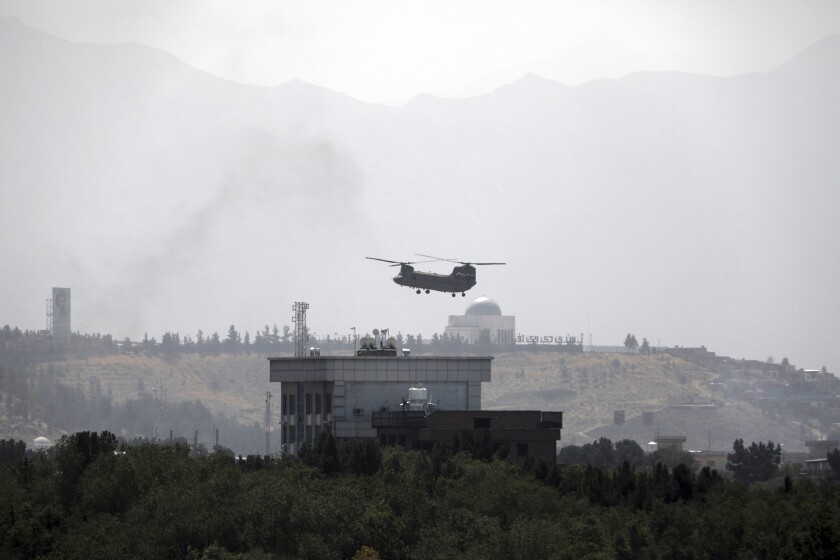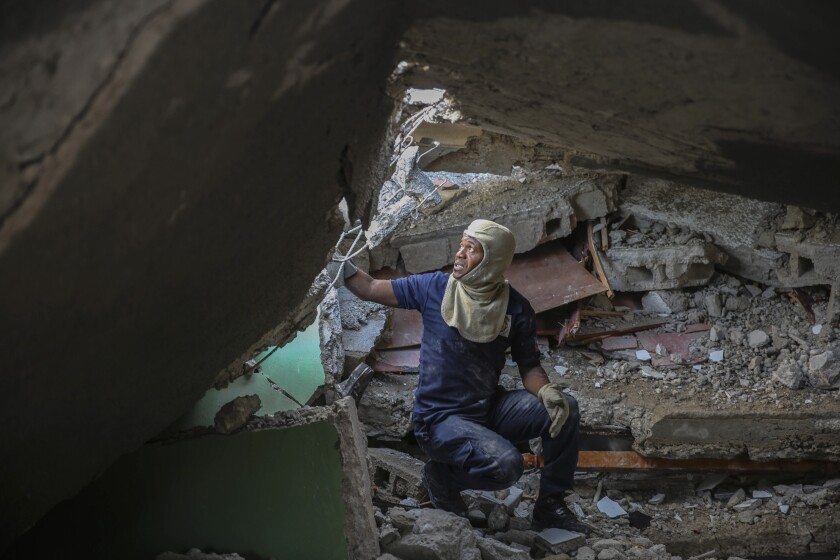Taliban enters Kabul, demands transfer of power; Afghan president reportedly flees country

Their takeover of Afghanistan all but complete, Taliban militants began moving into the capital, Kabul, on Sunday and demanded the unconditional surrender of the Afghanistan government against a steady thrum of helicopters ferrying Americans and other foreigners attempting to escape the country to safety.
The swift and humiliating defeat of two decades’ worth of U.S.-led efforts to remake Afghanistan opened a new and uncertain chapter in which Afghans opposed to the Taliban fear a return to their brutal medieval ruling style that eliminated civil rights, subjugated women and scorned education.
Afghan President Ashraf Ghani, who the day before aired a taped message of encouragement to the public, was reported to have fled the country. His departure leaves a vacuum that the Islamist insurgent group is expected to fill quickly.
From early hours Sunday, thousands of panicked Afghans stormed cash machines, pushed streets into massive gridlock complete with fistfights, and hunkered down in their homes as offices, including government agencies, emptied and shops boarded up against looters. At night, the streets turned quiet.
With 4,000 U.S. troops arriving in country or en route, the evacuation of the U.S. Embassy shifted into full gear. Helicopters airlifted American diplomats to the fortified airport to await departure. In the last hours, diplomats were destroying sensitive files, trashing laptops and disabling cellular telephones. The U.S. flag was reportedly lowered and removed as the most senior embassy officials departed.
Several other Western embassies were also closing.
Sporadic gunfire rang out through the day and night. It was unclear if that came from skirmishes or was celebratory. After nightfall, Afghan soldiers who had been manning checkpoints vanished.
“Today will be the end of our life,” a woman who gave her name as Shakila Sarwari, 22, said in an interview. Like tens of thousands of Afghans, she works for one of the Western agencies that have been operating in the country for nearly two decades and fears she will be an immediate target of the Taliban.
A large contingent of soldiers was posted outside the United Nations compound, and streets to the government palace were blocked off, possibly in anticipation of the arrival of a Taliban delegation.
Abdullah Abdullah, who headed the government delegation in talks with the Taliban that were taking place in Doha, Qatar, said in a videotaped message that Ghani had left Afghanistan.
“God will hold him accountable and the people of Afghanistan will make their judgment,” Abdullah said. Though on the same side, he and Ghani have long been rivals, with the president refusing demands he resign in order to reach a peace deal with the Taliban.
The Taliban claimed fighters were entering the city only to protect against looting and disorder as Afghan government security melts away. “We do not want to enter Kabul by military means,” the Taliban leadership said in a statement.
“The citizens of Kabul should not feel any fear from the Mujahideen,” the statement said, using the term the Taliban call themselves, adding that fighters “are not allowed to enter someone’s home, or to harass or annoy anyone.”
With astounding speed, the Taliban launched a relentless march across the country barely two weeks ago, capturing territory and then provincial capitals and finally major cities. Even as U.S. intelligence was forecasting it would take the Taliban a month or more to seize Kabul — and as President Biden and other U.S. officials insisted the fall of the capital was not inevitable — Taliban fighters had surrounded the city of 6 million by Sunday and were moving in by nightfall.
Tens of thousands of desperate, displaced Afghans find makeshift shelter in Kabul, itself in peril
Biden, who had recently announced that all U.S. forces would leave Afghanistan by September, on Thursday dispatched a contingent of 3,000 U.S. Marines and soldiers to help evacuate the embassy and to transport Afghans who worked for the U.S. and are in acute danger. On Saturday, he added 1,000 more troops to Afghanistan to aid in the fast-deteriorating crisis.
Most of the embassy had been evacuated by Sunday night, with staff at the airport or having already flown out of the country. In daylight hours, smoke could be seen rising from the diplomatic compound as officials burned sensitive material. Although the State Department initially insisted it was not shutting down the embassy altogether, those plans are now in flux.
Helicopters began shuttling staff from the embassy earlier Sunday, hours after the Taliban seized the nearby city of Jalalabad, the last major city besides the capital not already in Taliban hands.
Despite the collapse of the Afghan government and with criticism mounting, the administration seemed steadfastly unwilling to reverse its decision to withdraw all American troops and has pointed fingers of blame at a lack of leadership in the badly demoralized Afghan government forces. Critics say the abrupt departure of U.S. and NATO troops emboldened the Taliban.
“One more year, or five more years, of U.S. military presence would not have made a difference if the Afghan military cannot or will not hold its own country,” Biden said in a statement Saturday.
Abrarullah Murad, a lawmaker from the province where Jalalabad is, said the insurgents seized the city after elders negotiated the fall of the government there, the Associated Press reported. There was no fighting as the city surrendered, Murad said.
Acting Defense Minister Bismillah Khan sought to reassure the public that Kabul would remain “secure.”
But Taliban rule raises terrifying possibilities. There have been reports as the Islamic militants advanced that they were resorting to some of the tactics of their brutal rule of the 1990s, which claimed a basis in a radical interpretation of Islam. According to some reports, advancing fighters have executed surrendering soldiers and forced women into marriage.
The Taliban insists it has reformed and is a more modern and tolerant group, although there is little evidence supporting that claim. In the statement released Sunday, the group said it would offer an “amnesty” to those who worked with the Afghan government or foreign forces.
The shape any further negotiations between the Taliban and what’s left of the Afghan government was unclear. The two parties were engaged in the Doha discussions that have been portrayed by the U.S. as an effort to reach a political settlement to the conflict. Those talks began when the Trump administration negotiated an agreement with the Taliban in which the militant group agreed not to attack U.S. forces; in exchange, the U.S. was to begin withdrawing by May. Beside that one measure, however, the Taliban never agreed to anything else of substance.
Retreat of U.S. troops and advance of the Taliban leave veterans of the Afghanistan war conflicted
As the Taliban captures one capital after another in Afghanistan, the familiar Beltway parlor game of who “lost” the country has begun.
Yam reported from Kabul and Wilkinson from Washington.
Must-read stories from the L.A. Times
Get all the day's most vital news with our Today's Headlines newsletter, sent every weekday morning.
You may occasionally receive promotional content from the Los Angeles Times.








